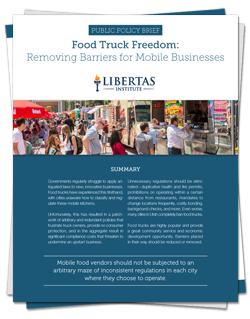Authored by Connor Boyack, President
 Governments regularly struggle to apply antiquated laws to new, innovative businesses. Food truck owners have experienced this firsthand, with cities unaware of how to best classify and regulate their mobile kitchens.
Governments regularly struggle to apply antiquated laws to new, innovative businesses. Food truck owners have experienced this firsthand, with cities unaware of how to best classify and regulate their mobile kitchens.
Unfortunately, this has resulted in a patchwork of arbitrary and redundant policies that frustrate truck owners, provide no consumer protection, and in the aggregate result in significant compliance costs that threaten to undermine an upstart business.
Unnecessary regulations should be eliminated—duplicative health and fire permits, prohibitions on operating within a certain distance from restaurants, mandates to change locations frequently, costly bonding, background checks, and more. Even worse, many cities in Utah completely ban food trucks.
Food trucks are highly popular and provide a great community service and economic development opportunity. Barriers placed in their way should be reduced or removed.





